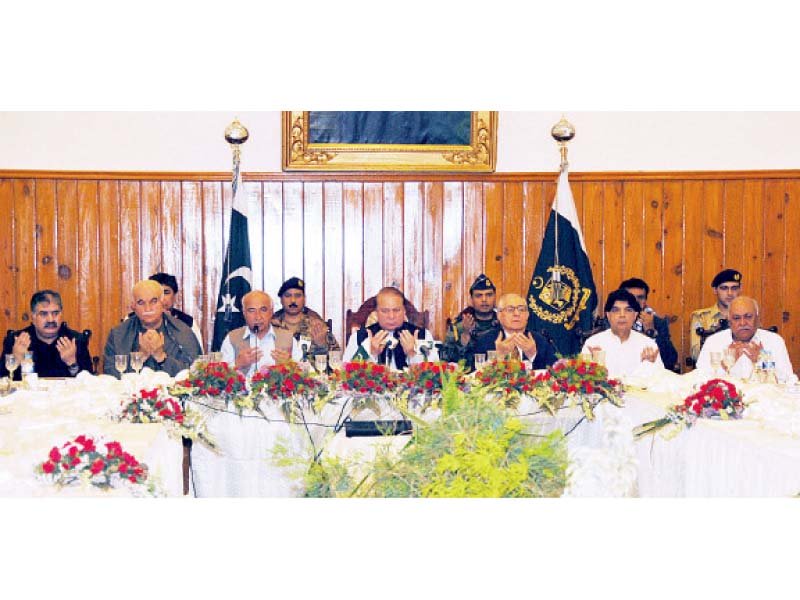
A multi-party confab concurred on Tuesday that the May 29 methodical slaying of 20-odd Pashtuns in the restive Mastung district was an abortive attempt by the ‘enemies of Pakistan’ to sow ethnic discord in Balochistan where hostile foreign agencies have been stoking violence to further their nefarious designs.
“The enemy wants to sabotage the multibillion-dollar China-Pakistan Economic Corridor (CPEC) project. A neighbouring country has already voiced its reservations,” Prime Minister Nawaz Sharif told an all-party conference (APC) at the Governor House in Quetta. The session was convened to devise a strategy to tackle internal and external security challenges in the volatile province.
By ‘a neighbouring country’ the premier meant India which has long been accused by Pakistani civil and military leaders of fomenting terrorism in Balochistan and elsewhere in the country as part of its attempts to destabilise Pakistan. Recent statement by Indian cabinet ministers that New Delhi must ‘neutralise terror with terror’ lent credence to such accusations.
The APC adopted a declaration which says anti-state elements were involved in terrorist attacks in Balochistan at the behest of ‘foreign powers’. “The enemy country is trying to destabilise Pakistan by orchestrating attacks like the killing of Pashtuns in Mastung and of Ismaili community members in Karachi,” the prime minister said.
Islamabad believes India’s top spy agency, the Research and Analysis Wing (RAW), is out to perpetrate terrorism in Pakistan by arming and bankrolling terrorists as New Delhi wants to undermine the ambitious CPEC project which, Islamabad says, will be economic ‘game changer’ for the region. India doesn’t hide its opposition to the multibillion-dollar project as its foreign minister Sushma Swaraj said on Monday that Prime Minister Narendra Modi has conveyed to Beijing that the CPEC is ‘unacceptable’ to New Delhi.
Referring to the Mastung massacre, Premier Nawaz said the enemy’s objective was to fuel hatred between two brotherly ethnic communities in Balochistan in an attempt to impede Pakistan’s march on the road to economic progress. “The sickening violence [in Mastung] was condemnable, but government and opposition leaders foiled the nefarious designs of the enemy by controlling the situation,” he added.
On May 29, gunmen had plucked ethnic Pashtun passengers from two Karachi-bound buses in the Khad Khocha area of Mastung and shot them dead execution-style. Though the main Baloch insurgent groups distanced themselves from the carnage, the United Baloch Army, a breakaway faction of Baloch Liberation Army, claimed credit for the grisly violence.
“We will frustrate the designs of those who want to fan ethnic hatred by forging unity among our ranks,” the prime minister added. “Local and international elements are involved in such incidents.”
Referring to his recent visit to North Waziristan where Operation Zarb-e-Azb has been ongoing since June, last year, Premier Nawaz said he has visited the erstwhile sanctuaries and hideouts of terrorists and saw how these have been eliminated.
Pakistan suffered massive economic losses to the tune of 110 billion dollars at the hands of extremists and terrorists, he said, adding that Pakistan was paying a heavy price in its fight against terrorism and would rid the country of this menace at all costs. Terrorists have started fleeing their hideouts and sanctuaries and their network has been busted, he said and praised the sacrifices of the ‘valiant men in uniform’.
The prime minister added that his administration would execute the new national counterterrorism plan at all costs and defeat terrorists. “We will restore peace in Quetta and the rest of Balochistan,” he said and claimed that the security situation has comparatively improved in the troubled province.
The prime minister credited the administration of Chief Minister Dr Abdul Malik Baloch for holding peaceful local government elections in the province. Conversely, he said, the LG elections held last week in Khyber-Pakhtunkhwa were the worst and bloodiest in recent parliamentary history of the country.
According to the APC declaration, all participants strongly condemned the unjust Mastung killings and expressed solidarity with the grieving families. They agreed that the Mastung massacre was a national tragedy like deadly attacks on army-run school in Peshawar and massacre of Ismaili community members in Karachi. They vowed to bring all culprits of Mastung carnage to justice.
The APC agreed that anti-state elements were involved in creating law and order problems in Balochistan at the behest of their ‘foreign masters’. “The enemy is not happy with the China-Pakistan Economic Corridor and it is trying to sabotage this project,” says the declaration.
The participants expressed complete confidence in the political and military leadership of the country and their efforts to eradicate terrorism from the country. “The civil and military leaders are on the same page and there will be complete unity and cooperation for eliminating terrorists from society,” reads the declaration.
Attendees at the APC included Governor Mohammed Khan Achakzai, Chief Minister Dr Abdul Malik Baloch, PkMAP chief Mehmood Khan Achakzai, JUI-F General Secretary Abdul Ghafoor Haideri, National Party President Senator Hasil Bezinjo, federal ministers Chaudhry Nisar Ali Khan and Abdul Qadir Baloch, Commander Southern Command Lt Gen Naseer Hussain Janjua, IGFC Maj Gen Sher Afgun and members of the provincial cabinet.
Published in The Express Tribune, June 3rd, 2015.


















1713904359-0/burn-(1)1713904359-0-270x192.webp)
















1713853507-0/MalalaHilary-(2)1713853507-0-270x192.webp)







COMMENTS
Comments are moderated and generally will be posted if they are on-topic and not abusive.
For more information, please see our Comments FAQ